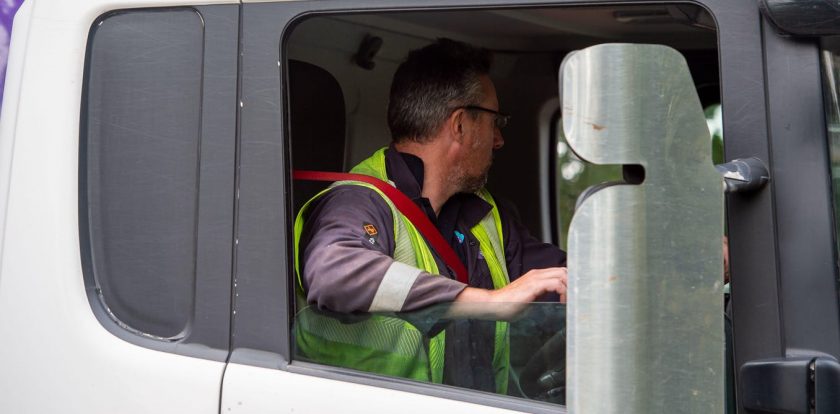Truck driver shortage won’t be solved by quick fix visas – here are three ways forward

The current shortage of heavy goods vehicle (HGV) drivers in the UK is hitting consumers hard, leading to distribution problems in food, fuel and groceries. Long queues have been seen at petrol stations across the UK and service stations are rationing fuel for customers.
The supply-chain problem has also triggered empty shelves in some major supermarkets. With a shortfall of over 100,000 HGV drivers, logistics operators are struggling to meet supermarket demand, and facing increased costs for hiring additional truck drivers to reduce delays.
Meanwhile, Morrisons, the UK’s fourth-largest supermarket chain, has already warned that a shortage of drivers will increase prices.
While many people are quick to blame the UK’s exit from the EU, there are a number of contributing factors: tax charges to truck drivers, drivers approaching retirement, training delayed by COVID-19, and increased competition for drivers from haulage companies are all contributing.
In response, some logistics providers are offering sign-on bonuses of about £2,000 to attract new drivers.
The government also has a plan to issue 10,500 temporary visas to foreign HGV drivers. However, this is a short-term fix and can only lead to minimal improvement until Christmas.
The problem with the quick fix
The proposed temporary visa scheme seems condescending by nature – it depicts foreign truck drivers as “disposable workers” that can be used and discarded after a short period. This is a recurring theme in UK history.
About 600,000 African soldiers were recruited to fight for Britain during the second world war, but these men were abandoned when the war was over.
Similarly, the UK needed people to rebuild the economy after the war and some workers were recruited from the Caribbean.
These immigrants worked in critical sectors like health, public transport and manufacturing, but were treated unfairly afterwards, denying certain legal rights to the workers and their families.
The current stress and pressure that migrant workers face during visa renewal presents a systemic obstacle to relocating and living in the UK.
The temporary nature of the proposed visa presents uncertainty in terms of career stability and long-term socioeconomic planning, especially for families.
The big picture
To help understand the reality of the present, the UK needs to critically review its past regarding migrant worker recruitment.
The government needs a more robust and sustainable solution to the national shortage of truck drivers.
The government should offer long-term benefits tor foreign HGV drivers and new incentives and schemes to develop skills domestically.
1. Training grants for future HGV drivers
The UK has an ageing HGV driver workforce, with few young people considering a career in this sector.
To build a lasting solution to the current problem, the government needs policies and programmes to facilitate and incentivise HGV training for the local population, especially young people.
Pertemps Driving Academy, with branches in England, Scotland and Wales, is setting the pace by offering free licence acquisition training (worth £5,000) to new drivers at its Worcestershire and Yorkshire branches.
In return, the beneficiaries are required to sign a two-year work contract with Pertemps.
The government should collaborate with driver recruitment agencies in the logistics sector to scale up this idea.
2. Enabling cross-sector job transition
Workers who have lost their jobs during the pandemic might need to consider truck driving as a new career – they may even make more money.
HGV drivers earn up to £35,000 per year on average, higher than the median annual earnings in the UK.
The main players in the UK logistics sector should provide easier and quicker pathways for other professionals and workers in relevant sectors to transition to new jobs where there are staff shortages.
For example, the Chartered Institute of Logistics and Transport should develop a programme to fast-track training and certification of transiting workers from other sectors.
3. Investing in autonomous vehicles
Undoubtedly, technology will impact future transportation. With Abiola Oladipo, the CEO of Manchester-based Tiwakiki Consulting, I am investigating the impact of smart logistics technologies like driverless trucks on global sustainability challenges.
Driverless trucks could support the UK logistics infrastructure for moving people and goods from a warehouse or distribution centre to the final delivery destination. The UK can tap into the potential of automated transport to proactively avoid future labour shortages in the logistics sector.
This might not be a short-term solution but it is where we are heading, as we currently have self-driving cars and automated railways. The government should spend some money to encourage small businesses and truck manufacturers to invest in smarter self-driving technologies that can drive the country’s logistics system more effectively.![]()
Temidayo Akenroye, Senior Lecturer, Procurement and Supply Chain Management, Liverpool John Moores University
This article is republished from The Conversation under a Creative Commons license. Read the original article.
Spotted something? Got a story? Email: [email protected]
Latest News
